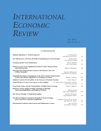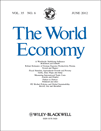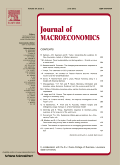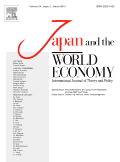
Journal of Economics
Scope & Guideline
Advancing economic discourse through rigorous research.
Introduction
Aims and Scopes
- Regional Economic Disparities:
Focused on examining wealth and income disparities within and between regions, particularly in Central and Eastern Europe, to understand the socio-economic implications of these inequalities. - Labor Market Dynamics:
Investigates issues related to employment, overeducation, and labor market mismatches, providing insights into the functioning of labor markets in transitioning economies. - Fiscal and Monetary Policy Analysis:
Analyzes the effects of fiscal and monetary policies, including the study of fiscal rules and central bank communications, to understand their impact on economic stability and growth. - Global Value Chains and Foreign Investment:
Explores how participation in global value chains and foreign direct investment influences economic upgrading, productivity, and competitiveness in the region. - Gender and Economic Outcomes:
Studies the intersection of gender and economics, including wage disparities and the impact of economic policies on different gender groups. - Informal Economy:
Examines the size and impact of the informal economy in post-transition countries, contributing to the understanding of economic informality and its implications for policy.
Trending and Emerging
- Impact of COVID-19 on Economies:
There is a notable increase in research focusing on the economic consequences of the COVID-19 pandemic, particularly regarding labor markets, gender disparities, and fiscal responses. - Educational Mismatch and Overeducation:
A growing body of work is addressing the dynamics of educational mismatch, particularly overeducation, and its implications for labor market outcomes, reflecting heightened concerns about workforce alignment with job market needs. - Regional Integration and Trade Linkages:
Research on the effects of regional integration and trade on productivity is gaining traction, emphasizing the importance of collaborative economic strategies within the EU. - Gender Disparities in Labor Markets:
An emerging focus on gender disparities in wage returns and labor market participation highlights ongoing issues of equality and economic justice. - Informal Economy Size and Implications:
Increasing attention is being directed towards understanding the informal economy, particularly in post-transition countries, as a critical area for policy development and economic planning.
Declining or Waning
- Traditional Economic Growth Models:
There appears to be a waning interest in traditional models of economic growth that do not account for contemporary challenges such as inequality and the digital economy. - Agricultural Economics:
Research specifically focused on agricultural economics and rural development is less prominent, indicating a potential shift in interest towards urban economic issues and broader economic policies. - Exchange Rate Studies:
Studies specifically on exchange rates and their fundamentals are becoming less frequent, possibly as researchers pivot toward more pressing economic issues such as labor markets and fiscal policies.
Similar Journals

Economia-Journal of the Latin American and Caribbean Economic Association
Connecting Economists to Drive Regional ProgressEconomia - Journal of the Latin American and Caribbean Economic Association, published by LSE Press, serves as a vital platform for the dissemination of economic research pertinent to the Latin American and Caribbean regions. Since its inception in 1977, this Open Access journal has embraced an inclusive approach, ensuring that valuable insights are readily accessible to a global audience. With an ISSN of 1533-6239, Economia aims to highlight issues related to economic development, policy analysis, and international economics, making significant contributions to the fields of economics, political science, and international relations. It currently ranks in the Q4 category across several related fields, reflecting its emerging status in the academic discourse. The journal's commitment to fostering interdisciplinary dialogue is evident through its annual publications, making it an essential resource for researchers, professionals, and students eager to engage with contemporary economic challenges and innovations in the region.

INTERNATIONAL ECONOMIC REVIEW
Fostering scholarly dialogue in economics and econometrics.INTERNATIONAL ECONOMIC REVIEW is a prestigious journal dedicated to advancing knowledge in the fields of economics and econometrics. Published by Wiley in the United Kingdom, this journal boasts an impressive Q1 ranking in the 2023 category of Economics and Econometrics, reflecting its significant impact in the academic community. With a continued publication since its inception in 1979, it offers a platform for rigorous scholarly articles that address contemporary issues, theoretical developments, and empirical findings in economics. Although it does not currently offer open access options, the journal maintains broad accessibility through institutional subscriptions. Researchers, professionals, and students are encouraged to contribute to and engage with this leading publication to foster knowledge exchange and stimulate scholarly dialogue in economic research. With its commitment to high-quality scholarship, the INTERNATIONAL ECONOMIC REVIEW remains a vital resource for developing insights that inform both policy and practice.

WORLD ECONOMY
Unveiling critical research for a better financial future.WORLD ECONOMY is a premier academic journal published by Wiley, renowned for its rigorous peer-reviewed research in the fields of economics, finance, accounting, and political science. Established in 1977, the journal has consistently contributed to the advancement of knowledge, reflected in its strong standing across various category quartiles, notably achieving Q1 in Accounting and Political Science, and ranking in the top quartile in its respective disciplines as of 2023. With an audience that spans researchers, professionals, and students, WORLD ECONOMY publishes impactful articles that explore critical issues affecting the global economy. Although it is not an open-access publication, readers have access options to engage with cutting-edge research that addresses both theoretical and practical aspects of world economic trends. The journal's commitment to excellence is further underscored by its impressive Scopus rankings, situating it among the top journals in the social sciences arena. For anyone keen on deepening their understanding of the dynamics shaping our economic landscape, WORLD ECONOMY remains an indispensable resource.

Prague Economic Papers
Empowering Economists with Cutting-Edge ResearchPrague Economic Papers is an esteemed scholarly journal dedicated to the fields of Economics, Finance, and Econometrics, published by UNIV ECONOMICS-PRAGUE. With its ISSN 1210-0455 and E-ISSN 2336-730X, this journal serves as a vital platform for innovative economic research and theoretical advancement. Operating from the scenic backdrop of the Czech Republic, Prague Economic Papers is recognized in Scopus with rankings that place it in quartile Q4 for Economics and Econometrics, as well as Q3 for Finance, reflecting its growing impact in the academic sphere. Though the journal does not currently offer open access, it ambitiously covers a wide expanse of economic theories and empirical studies, contributing significantly to the evolution of economic thought from 2008 to 2024. Researchers, professionals, and students alike will find this journal essential for accessing critical insights and methodologies that shape contemporary economic discourse.

Economies
Unveiling the complexities of economies for all.Economies is a premier open-access journal published by MDPI, dedicated to advancing the fields of economics, econometrics, and finance since its inception in 2013. With an E-ISSN of 2227-7099, the journal plays a vital role in disseminating high-quality research that addresses contemporary global economic challenges, fostering a collaborative platform for scholars, industry professionals, and policymakers alike. The journal is based in Switzerland and has gained significant recognition in the academic community, evidenced by its Q2 ranking in both Development and Economics, Econometrics and Finance categories, along with impressive Scopus rankings—55th out of 242 in Economics and 79th out of 306 in Social Sciences Development. This positions Economies as a key resource for those seeking to stay at the forefront of economic research and thought leadership. The journal’s commitment to open access ensures that valuable insights and findings are readily available to the global research community, enhancing knowledge sharing and innovation in the field.

Montenegrin Journal of Economics
Empowering Economic Discourse GloballyMontenegrin Journal of Economics, published by ECONOMIC LABORATORY TRANSITION RESEARCH PODGORICA-ELIT, stands as a prominent platform for scholarly discourse in the field of Economics, Econometrics, and Finance. With an ISSN of 1800-5845 and an E-ISSN of 1800-6698, this open access journal has been providing accessible research output since 2005, contributing significantly to the global academic community. The journal’s impact is reflected in its Q2 ranking in the 2023 category of Economics, Econometrics and Finance, holding a commendable position within the 81st percentile according to Scopus rankings. The scope includes a wide array of topics pertinent to economics and finance, encouraging contributions that enhance understanding of both local and global markets. With a focus on quality research, the journal aims to disseminate knowledge that supports informed policy-making and fosters economic development, making it an invaluable resource for researchers, professionals, and students dedicated to the evolving landscape of economic studies.

Equilibrium-Quarterly Journal of Economics and Economic Policy
Pioneering Research for Impactful Economic PoliciesEquilibrium-Quarterly Journal of Economics and Economic Policy is a leading open-access journal, published by the Institute of Economic Research in Poland. Since its inception in 2011, this journal has served as a vital platform for disseminating innovative research and scholarly discourse in Economics and Economic Policy. The journal maintains a high impact within the academic community, currently holding a Q2 ranking in Economics and Econometrics and a Q1 ranking in the miscellaneous category of Economics, Econometrics, and Finance as of 2023. With an impressive Scopus ranking, it sits at #8 out of 242 in its field, demonstrating its commitment to quality and relevance in contemporary economic research. The journal welcomes contributions that advance theoretical and empirical discussions, encompassing a broad spectrum of topics in economics, thereby appealing to researchers, professionals, and students alike. Through its open access model, Equilibrium ensures widespread availability of knowledge and fosters collaboration across disciplines within the global economic community.

REVUE ECONOMIQUE
Navigating the Landscape of Economic ThoughtREVUE ECONOMIQUE, published by PRESSES FOND NAT SCI POLIT in France, is a distinguished academic journal with an ISSN of 0035-2764 and an E-ISSN of 1950-6694. Established in 1974, the journal has evolved significantly over the years, focusing on a diverse range of topics within the field of economics, econometrics, and finance. With its commitment to presenting in-depth research and innovative perspectives, REVUE ECONOMIQUE serves as a vital resource for scholars, professionals, and students seeking to enhance their understanding of economic theories and practices. Although it is currently categorized in the Q4 quartile, ranking 241 out of 288 in the field, the journal aims to foster new dialogues and disseminate valuable insights that contribute to the economic discourse. The journal is not available as open access, but its rich repository of articles continues to attract readers interested in the complexities of economic dynamics. For more information, you can refer to their address at 27 RUE SAINT-GUILLAUME, 75341 PARIS 07, FRANCE.

JOURNAL OF MACROECONOMICS
Charting the Course of Macroeconomic ThoughtJOURNAL OF MACROECONOMICS, published by Elsevier, stands as a significant platform for scholarly discourse in the field of economics and econometrics. With an ISSN of 0164-0704 and an E-ISSN of 1873-152X, this journal has been actively contributing to the academic community since 1979 and continues to publish impactful research through 2024. It is recognized within the Q2 category for Economics and Econometrics in its 2023 quartile rankings, and it holds a respectable Scopus ranking of #353 out of 716 in its field, placing it in the 50th percentile. Despite not being an open-access journal, it provides valuable insights into macroeconomic theories, empirical assessments, and policy implications, making it an essential resource for researchers, professionals, and students aiming to deepen their understanding of macroeconomic dynamics. To access a breadth of contemporary research and enhance your academic pursuits, consider diving into the latest issues of this esteemed journal, conveniently located in Amsterdam, Netherlands, at RADARWEG 29, 1043 NX.

JAPAN AND THE WORLD ECONOMY
Advancing Understanding of Japan's Role in Global EconomicsJapan and the World Economy, published by Elsevier, stands as a prominent platform for scholarly discourse at the intersection of economics, finance, and political science. With its ISSN 0922-1425 and E-ISSN 1879-2006, this journal has been serving the academic community since 1988, offering a critical lens through which to analyze Japan's economic and global trade relationships. With an impressive impact in the 2023 rankings, the journal is classified in the Q2 category across three key fields: Economics and Econometrics, Finance, and Political Science and International Relations. Notably, it ranks #181 out of 706 in Political Science and International Relations and #337 out of 716 in Economics, highlighting its influence and relevance. Although it is not an open-access journal, its rigorous peer-reviewed articles are invaluable for researchers, professionals, and students alike, aiming to deepen their understanding of the economic dynamics involving Japan and its international partners. As we look towards the journal's continued impact through 2024 and beyond, it remains an essential resource for those engaged in the complexities of global economics.